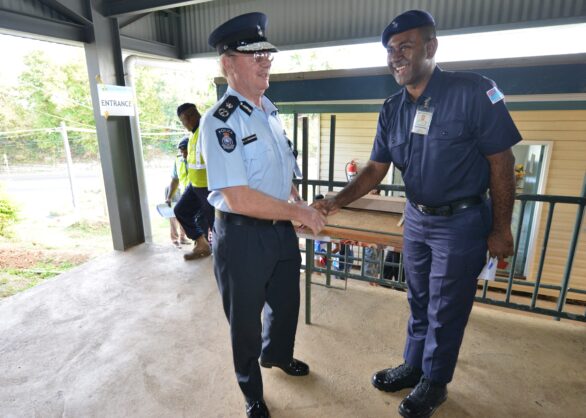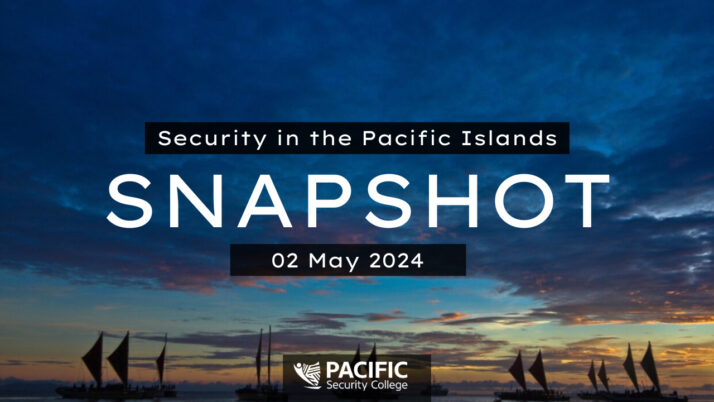Bridging the cultural gap: combatting transnational crime in the Pacific

Photo by Peter Parks/AFP
For effective cooperation in combatting transnational crime, Australia and New Zealand need to look at a hybrid system of policing underpinned by cultural awareness, Jose Sousa-Santos writes.
At his farewell parade in Nuku’alofa, Tonga’s recently departed Police Commissioner Stephen Caldwell highlighted the challenges posed by the increasing prevalence of illicit drugs in the community and the need to forge partnerships with local and regional actors to stop their spread in the community. As he said, “the police cannot do this alone”.
The Pacific’s law enforcement agencies face deep and complex challenges in responding to criminal activity within and across the region. One of the most pressing is the growing connection between the transnational and local criminal landscapes in the Pacific.
The increasingly localised nature of transnational crime in the region involves the spillover of drugs into communities, the role of local actors as facilitators, and the societal impact of drug addiction and associated criminal and violent behaviours. The emergence of nascent indigenous regional criminal syndicates and their interaction with transnational criminal organisations will significantly alter the security landscape.
The COVID-19 pandemic has done little to disrupt the trafficking and production of drugs in the Pacific Island region. Rather, transnational organised crime syndicates have adapted and sought new ways to profit from the pandemic. In Fiji, for example, police have warned that local production of illegal drugs is on the rise with clandestine laboratories producing drugs more lethal than methamphetamines. Law enforcement agencies must also adapt, but, in Caldwell’s words, they cannot do so alone.
Policing transnational crime in the Pacific demands innovative thinking about the role that local partners – and their unique strengths – can play in firming up resilience and resistance against transnational crime. In the war on drugs in the Pacific, the cultural, social and hierarchical web of traditional power structures and societies serve as the frontline against illicit activities. At times, this web can also be a shield and facilitator for actors reliant on impenetrable networks.
For the Pacific’s policing partners, primarily Australia and New Zealand, understanding and incorporating this knowledge is critical to being more effective partners. In a policing context, cultural practices and approaches such as the talanoa method which privileges Pacific people’s worldviews offer unique insights and tools into how to conduct interviews in a more effective, culturally appropriate, and context-specific manner.
This enables law enforcement agencies to gather information otherwise not accessible through traditional police investigations. Drawing on the talanoa approach is the best method to access and engage with this resource.
Communities in the Pacific have long known they are on the frontline of the war on drugs. In 2020 alone, police on the Fijian island of Kadavu seized 67,679 marijuana plants with a total street value of US$57 million, whilst a further US$14.5 million worth has been seized in the first two months of 2021. In light of this, Kadavu’s Roko Tui (chief) Kitione Raibevu told media that the police need “support and assistance from the communities” to eradicate drugs from the island.
During a private interview in 2019, a Tongan official told this author: “there are both levers and limitations for traditional and church authorities combatting transnational crime in the Pacific. The levers are drawn from the strength of moral authority and faith-based belief systems within communities. This includes the strong network and mobilisation abilities that churches have within Pacific countries and territories and across the region.”
In recognition of the importance of community involvement, in 2018 the Tongan Government established the National Drugs Steering Committee which is comprised of government agencies and non-state community leaders. However, the limitations for traditional power structures and church authorities include the moral, cultural and religious constraints in discussing topics deemed sensitive, and the patriarchal nature of traditional and church hierarchies impacts the ability of men and church leaders to engage with vulnerable women and girls.
Greater engagement with these power structures will ensure that drug harm strategies are in context and culturally appropriate, centred on a human security approach. This approach should draw from law enforcement, government, civil society, and traditional power structures.
It is not only communities in the islands who are at the frontline. Pasifika diaspora in Australia, New Zealand, the United States, and beyond can have both positive and negative impacts on Pacific communities. A notable example of the latter occurred in 2018, when it was found the Tongan diaspora often unwittingly fund illicit activities via pawn shops on the islands which actively export stolen cultural artifacts to overseas diaspora and collectors for sale.
From a policy perspective, rethinking how to embed agility within local and regional responses to transnational crime is challenging in itself. However, this is an opportunity to explore how to develop and institutionalise a hybrid approach to law enforcement in the Pacific which incorporates both Western policing models with indigenous methods that place culture and community at the centre.
A Pacific-led, partner supported model to combat transnational crime would foreground Pacific knowledge and context-specific expertise, as well as provide an opportunity for Australia and New Zealand to strengthen their security relationships in the region. Deeper cultural training and local understanding is needed for Australian and New Zealand agencies to better enable their officials to effectively bridge the cultural gap with their Pacific Island counterparts.
Jose Sousa-Santos
More Stories

Security Snapshot - 2 May 2024
Pacific Security Snapshot | 02 May 2024
Summary ➣ Increasing measures taken around the region to protect environmental security ➣ Results uncertain following elections in Solomon Islands ➣ PNG discusses plans for a council on gun violence and control ➣ Progress and setbacks for LGBTQI+ communities Regionalism Pacific leaders travelled to Greece in April for the 9th Our Oceans Conference. The conference…
Security Snapshot - 28 Mar 2024
Pacific Security Snapshot | 28 March 2024
Summary ➣ Heavy rains, floods, landslides and earthquakes batter the region ➣ Pacific submissions to the International Court of Justice (ICJ) on climate change responsibility ➣ Elections across the Pacific prompting changes to diplomatic relations and security arrangements ➣ Challenges for women in politics Climate Security Lives have been lost in PNG after a series…






